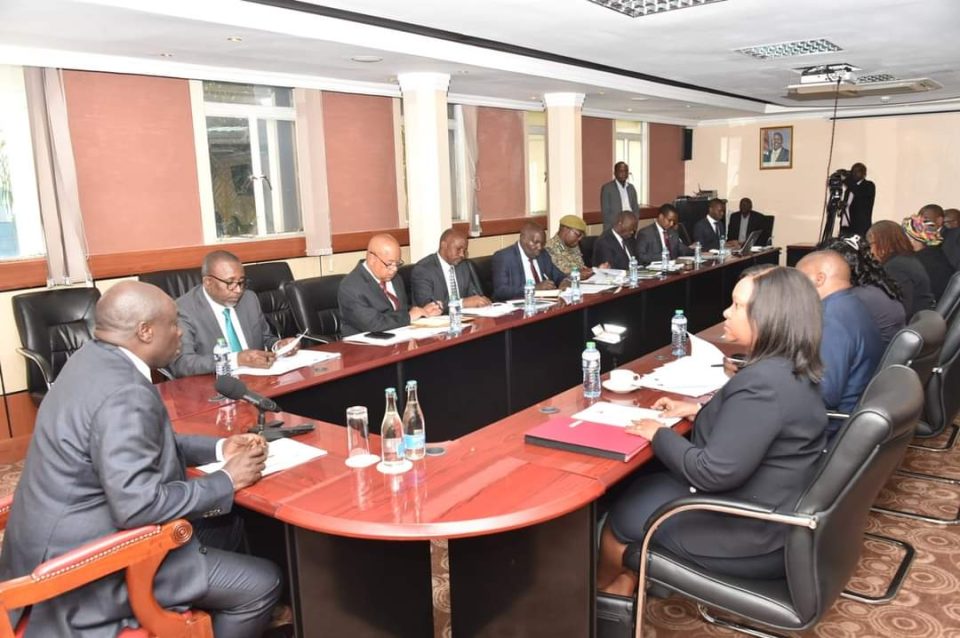The government has set aside Sh2 billion for immediate response to the raging drought and famine.
Making the announcement, Deputy President Rigathi Gachagua further called for consolidation of public and private sector interventions.
Presiding over a Consultative Meeting on the Drought Situation in the country at his Harambee House Annex office on Monday, Gachagua asked the ministries and government agencies to include other partners in the response to avoid duplication of roles in combating the drought that has affected more than 5.3 million people.
“We have a responsibility to save lives and livelihoods,” the DP told the meeting, which included Cabinet Secretaries, Prof Kithure Kindiki (Interior), Mithika Linturi (Agriculture), Rebecca Miano (Arid and Semi-Arid Lands) and Peninah Malonza (Tourism) and other top government officers.
The Deputy President said the response is urgent even as it seeks a long term solution.
Under this plan, which is part of the ongoing immediate responses, agencies like the Kenya Defence Forces, Kenya Meat Commission, the Kenya Wildlife Services, the National Drought Management Authority (NDMA), and the Kenya Meteorological Department will work with key ministries to identify and mitigate the drought effects.
To date, various mitigation efforts have been deployed to the most affected parts of the country. These include the distribution of relief food, the trucking of water to those in need, the drilling and rehabilitation of boreholes, and a livestock offset programme that was spearheaded by the Kenya Meat Commission with the support of the Kenya Red Cross.
These interventions, as well as others such as the scaling up of the Hunger Safety Net Programme by NDMA and the School Feeding Programme championed by the Ministry of Education, have all provided some relief to the most affected populations.
Data from NDMA shows that at least 4.35 million people in 23 counties are facing starvation with another 846,000 in nine additional counties in need of assistance.
Between September 2022 and January 2023, the government spent at least Sh3.2 billion in emergency responses.
The Deputy President also suggested that some areas within counties which exhibit ASAL characteristics be classified under the same.
Some of them include Tharaka (Tharaka Nithi County), Kieni (Nyeri County), Mbeere (Embu County), Ndeiya (Kiambu County) and Nyatike (Migori County).
“We need to bring them under ASALs so that they benefit from these interventions,” the Deputy President said.
The National Steering Committee on Drought Response, has been coordinating the immediate responses to save lives and livestock amidst five failed rain seasons, which led to crop failure.
Although the recent short rains provided some relief in parts of the country, experts say that the respite will be short-lived.
Already, more than 2.5 million heads of livestock have been lost. It is feared that without a redoubling of the relief efforts, the situation could worsen.
The Meteorological Department has predicted that the rains will be limited until the second third week of March, which will mark the onset of the prolonged season until May 2023, which too will see less than average rainfall across the country.
Apart from food insecurity, the unpredictable weather patterns and the depressed rainfall also pose a security threat.
“The prolonged drought has escalated communal conflicts in many parts of the country where diminished resources have led to heightened, sometimes violent conflict,” Prof Kindiki said.
Agriculture and tourism, which have for decades formed a solid foundation for the growth of the country’s economy, are also drastically affected by the drought.
Key species within important ecosystems such as the Tsavo National Parks and Amboseli are also bearing the brunt of the drought.
To date, more than 200 elephants have died with the surviving key species venturing out of protected areas and into communities further increasing cases of human-wildlife conflict.
The consultative meeting also agreed to work towards long-term, sustainable solutions that will offer respite for Kenyans in the face of the global climate crisis.
With all indications that rainfall will be depressed this year, the government is set to mobilise some Sh57. 36 billion for short-term and long-term sustainable programmes, which will be gradually implemented until October 2023.

